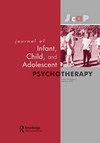Being a Foster Child: The Tenacity of Reparative Illusion and Witnessing Parental Loss
Q3 Psychology
Journal of Infant, Child, and Adolescent Psychotherapy
Pub Date : 2022-04-03
DOI:10.1080/15289168.2022.2067976
引用次数: 1
Abstract
ABSTRACT This discussion of David Price’s paper focuses on the tenacity of reparative illusion and the significance of witnessing parental loss. In recent years the witnessing concept has come into prominence in considering people who have suffered through major historical trauma, such as the genocide that occurs in war-torn areas. The author argues that some of the most despicable and destructive horrors occur in everyday, domestic life, plain for everyone to see, yet somehow impossible for people to see. The traumatic experience of many foster children is difficult to hear, yet must be witnessed to help them heal and mourn. It’s important for the clinician to hear, hold and contain all that the foster care survivor has endured. As clinicians, we need to recognize how difficult it is to relinquish the fantasy of the caring, nurturing mother who returns.作为一个寄养儿童:修复幻觉的坚韧和目睹父母的失去
摘要:本文主要讨论了修复性错觉的韧性以及目睹父母失去的意义。近年来,在考虑遭受重大历史创伤的人,例如在饱受战争蹂躏的地区发生的种族灭绝时,见证的概念变得突出起来。作者认为,一些最卑鄙、最具破坏性的恐怖事件发生在日常家庭生活中,每个人都显而易见,但人们却不可能看到。许多寄养儿童的创伤经历很难听到,但必须亲眼目睹,以帮助他们愈合和哀悼。对临床医生来说,倾听、把握和包容寄养幸存者所经历的一切是很重要的。作为临床医生,我们需要认识到,要放弃对母亲归来的关爱和养育的幻想是多么困难。
本文章由计算机程序翻译,如有差异,请以英文原文为准。
求助全文
约1分钟内获得全文
求助全文
来源期刊

Journal of Infant, Child, and Adolescent Psychotherapy
Psychology-Clinical Psychology
CiteScore
1.70
自引率
0.00%
发文量
37
 求助内容:
求助内容: 应助结果提醒方式:
应助结果提醒方式:


